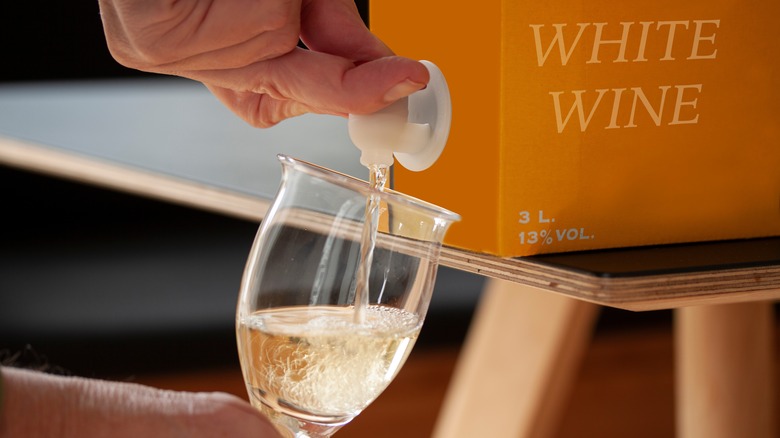The Reason Australians Call Boxed Wine Goon Sacks
If boxed wine was your go-to beverage in college, it turns out you have Australia to thank for the invention. A winemaker from down under, Thomas Angove, first patented the creation all the way back in 1965. There's a bit of debate here among Americans, some of whom claim that it was actually William R. Scholle of Scholle Packaging who dreamed up boxed wine in the 1950s. But either way, these boozy bags remain a staple in Australian drinking culture today – so much so, in fact, that up to half of the continent's wine is sold out of boxes, according to Forbes.
But if you take a trip to the other side of the world, you may hear boxes of wine called by their local nickname: goon sacks. This illustrious term may come from the Queensland Aboriginal word gun, meaning water, which later morphed into goom, an Australian English term for water or booze. However, it's also possible that this nickname came from the word flagon, which was the half-gallon bag that Angove originally used for his invention. Today, goon is synonymous with boxed wine in Australian slang, which leaves us with goon sacks, the inner bags that contain the wine inside the wine boxes.
Goon sacks changed the way Australians drink wine
Goon sacks (also known as goon bags, wine casks, box monsters, and red handbags), changed the game for wine in Australia. Before their invention, wine was mostly consumed during special events, but today's world down under sees plenty of everyday occasions and traditions centered around boxed wine. Take the goon of fortune, for example, a game in which the inner wine sack is attached and spun on a clothesline (also known as a hills hoist), with participants sitting underneath. Once the sacks come to a halt, whoever it lands on must guzzle accordingly. In another wine-bag based game, called a goon layback, participants lie on the floor with their feet on the wall while someone pours the juice into their mouth.
If the only experience you've had with goon sacks was back in your early 20s, you may want to consider revisiting them during the rest of your adult years. As popular as they are in Australia, even winemakers there grapple with fighting their stigma as a cheap, inferior vino. Today, not only is it perfectly okay to cook with boxed wine, but also you shouldn't count it out even if you drink it straight — it tends to last longer than bottles once opened, it boasts packaging with a lower carbon footprint, and it's possible to find a wide range of good-quality boxed wine offerings in today's world.

